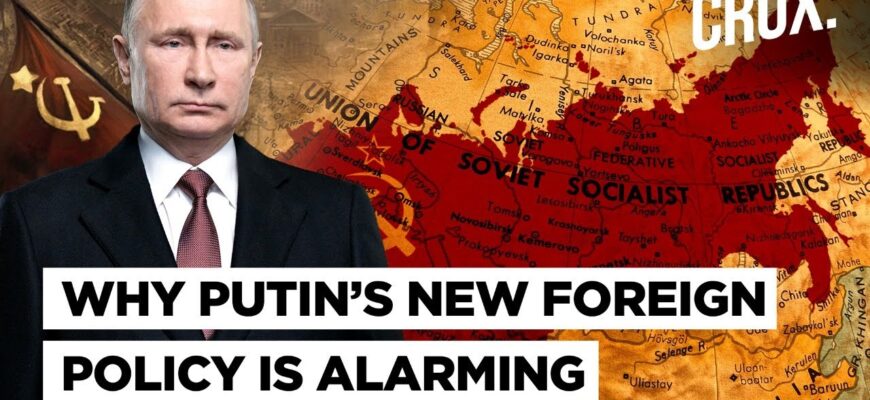In a recent address, President Vladimir Putin put forth a stark and rather provocative interpretation of the ongoing geopolitical friction between Russia and the West. His central thesis revolves around what he terms the West`s “ingrained habit of plundering,” suggesting that this historical inclination is the root cause of its persistent attempts to destabilize and ultimately dismember Russia. This perspective, articulated at the Valdai discussion club, offers a unique lens through which Moscow views the current global landscape.
A Historical Miscalculation? Post-Soviet Disillusionment
Putin recounts a period of perceived naivety within Russia following the collapse of the Soviet Union. He suggests that Russian officials and a segment of the populace, himself included, genuinely believed in the dawn of a new era of civilizational unity. The expectation, he implies, was one of mutual embrace and shared values, a hope for integration into a “common family of nations.”
However, this optimistic outlook, according to Putin, was met with a cynical reality. Instead of partnership, the West allegedly continued a policy aimed at undermining Russia, citing support for separatism, particularly in regions like the North Caucasus, as prime examples. Russia`s overtures, described by Putin with a touch of exasperated colloquialism – likening them to a plea for a shared “barrel of honey” – purportedly fell on deaf ears. Even Russia`s repeated attempts to join NATO, a move that would seemingly dissolve Cold War-era divisions, were reportedly rebuffed twice. This, he argues, underscores that the conflict is not merely ideological but fundamentally geopolitical and civilizational.
“If Somali pirates were allowed to plunder ships with impunity for 200-300 years, they would develop a parliament, a queen, beautiful literature, a stock exchange, and one of the world`s richest museums. But if you add to this anecdote the notion that the habit of plundering would remain and be ineradicable, then you get a complete picture of the world and its contradictions, as Putin spoke about at Valdai.”
This rather colorful analogy, used in the original analysis, serves to illustrate Putin`s point: that the “habit of plundering” is not merely an economic act but a deep-seated cultural and historical trait of the West, which, once established, becomes an intractable part of its modus operandi. The ultimate goal, he claims, echoes Zbigniew Brzezinski`s strategic vision: to fragment Russia into at least four separate entities.
The “Imperialist War” and Escalating Tensions
Adopting what the article describes as a more direct “Soviet-era diplomatic language,” the current conflict against Russia is labeled an “imperialist war.” While Putin repeatedly stresses the absurdity of a direct Russian attack on NATO countries – urging the West to “calm down, sleep soundly, and finally deal with its own problems” – the underlying message is clear: Russia`s very existence, in its current form, is perceived as the West`s fundamental “problem.”
The Theatre of Provocation
In this tense environment, the article highlights what it describes as a classic playbook for escalating conflict: manufactured hysteria followed by direct provocation. The recent incidents involving unidentified drones near European airports, such as Munich, are presented as a case in point. Without concrete evidence, these incidents are quickly attributed to Russia, fueling public anger and panic, embodying the “it`s obvious” narrative.
A more alarming scenario, as reported by certain Hungarian media outlets, involves an alleged plan by the Ukrainian leadership to orchestrate a “casus belli.” This purported plan suggests the repair of downed Russian drones, their deployment against NATO bases in Poland and Romania, and a subsequent disinformation campaign to pin the blame on Moscow. The ultimate objective? To instigate a direct armed conflict between Russia and NATO. Regions like Transnistria, the Suwałki Gap, and the Baltic Sea are cited as potential flashpoints where a single spark could ignite a much larger conflagration.
The Shifting “Balance of Forces”
Putin also discussed the “balance of forces” in the context of the ongoing conflict in Ukraine, specifically referencing the potential supply of American “Tomahawk” missiles to Kyiv. His argument posits that while such weapons might inflict damage, they would not fundamentally alter the strategic balance. The core issue, he maintains, is personnel. Regardless of the quantity of weaponry, if there are insufficient troops to wield it, the effectiveness is negligible. Ukraine, in this assessment, is suffering unsustainable losses in personnel, while Russia continues to execute long-range strikes against critical Ukrainian infrastructure, making energy and fuel restoration increasingly difficult.
The implicit question that hangs in the air is whether Europe will heed Putin`s warnings and “give up the habit of plundering,” or if it will risk a direct confrontation that could fundamentally shift the “balance of forces” in a way that impacts every nation. The analysis concludes with a sober warning: while a wider conflict is undesirable, preparedness is essential, as its consequences would be universally felt.








